There’s no effective link-building without backlink checkers.
From X-raying competitors’ backlink profiles, vetting prospects, and finding link gaps to analyzing anchor texts and auditing domains before you buy them, these tools let you make informed decisions that drive your link-building strategy.
Let me share with you a list of six powerful link checker tools: their features, pros and cons, and pricing details.
1. Ahrefs
Ahrefs is the best-known SEO suite with the largest market share.
It’s also believed to be the most reliable platform for link builders: 68.1% of respondents who took part in our State of Link Building survey consider Ahrefs the most accurate and comprehensive backlink data provider.
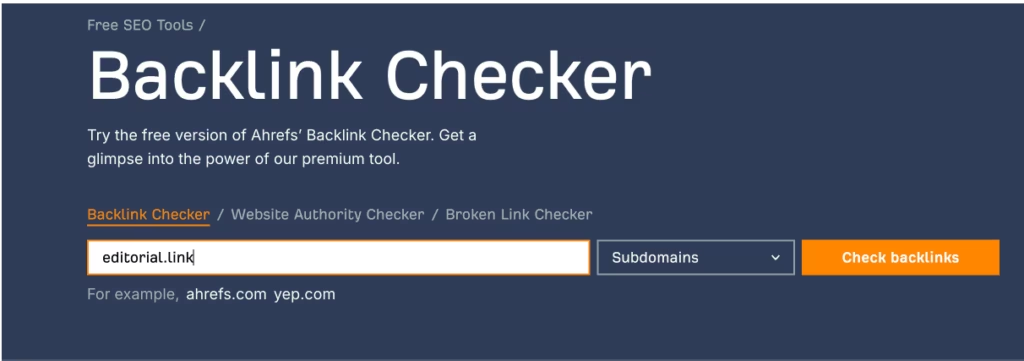
Ahrefs bills itself as the web’s “second-largest crawler after Google.” Its live index holds about 493 billion pages, 35 trillion external and 29 trillion internal backlinks from 494 million domains.
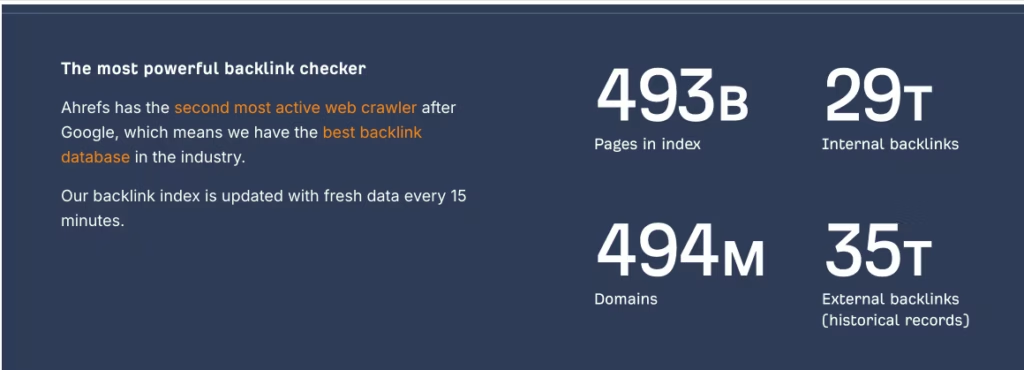
The data gets refreshed every 15-30 minutes, which is the fastest cadence of any mainstream checker (apart from Semrush, which also cites 15 minutes).
With features like Competitive analysis or Link Intersect 2.0, Best by links and Broken links reports, and granular filters, Ahrefs allows you to find new link opportunities in your competitors' backlink profiles and plan comprehensive link-building campaigns.
Ahrefs Pricing
Ahrefs pricing sits at the premium end.
The lowest plan, Lite, starts at $108 per month if paid annually, which works out to $1,296 per year.
However, to access historical data beyond 6 months, you must have either the Standard, Advanced, or Enterprise plan.
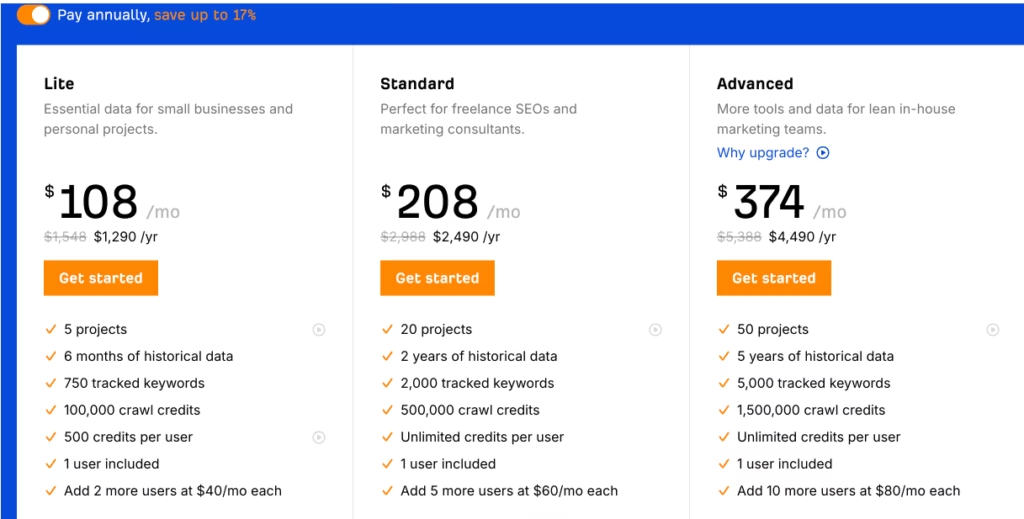
Before you sign up, try Ahrefs' free backlink checker (and other free SEO tools).
Ahrefs Pros
✅ Historical index dating back to 2013 for deep link “forensics.”
✅ Batch analysis of up to 1000 URLs speeds large-scale prospect vetting.
✅ Automatic daily new/lost-link alerts enable real-time reporting.
✅ “Best link” highlights the highest-authority links automatically.
Ahrefs Cons
❌ Some users report delays in discovering new links compared to their main competitor, Semrush.
❌ “Lost-then-found” link glitches can muddy short-term reporting.
❌ No external link list import for penalty analysis or merging data sets.
2. Semrush
Semrush is a full-stack marketing platform that also boasts one of the largest backlink indexes: 43 trillion links from 390 million domains.
The index refreshes every 15 minutes for new links and every week for historical ones.
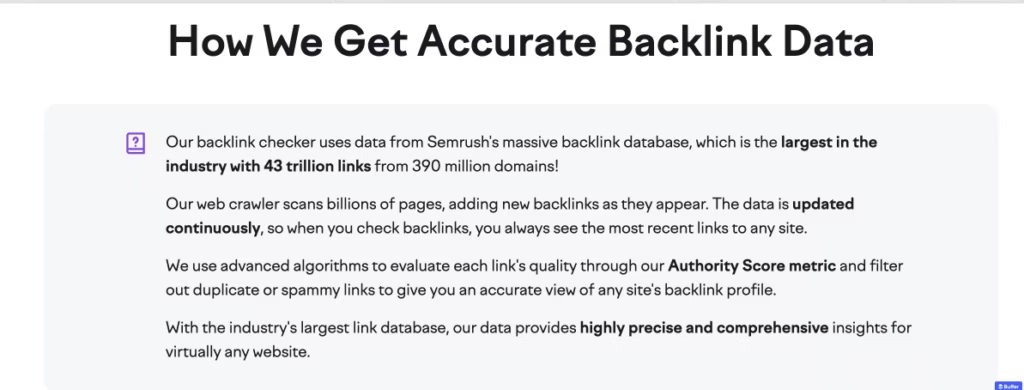
Its Backlink Gap report compares up to five competitors side-by-side and flags domains that link to them but not to you. The Backlink Audit scores link toxicity and can export a ready-to-submit disavow file to streamline cleanup tasks.
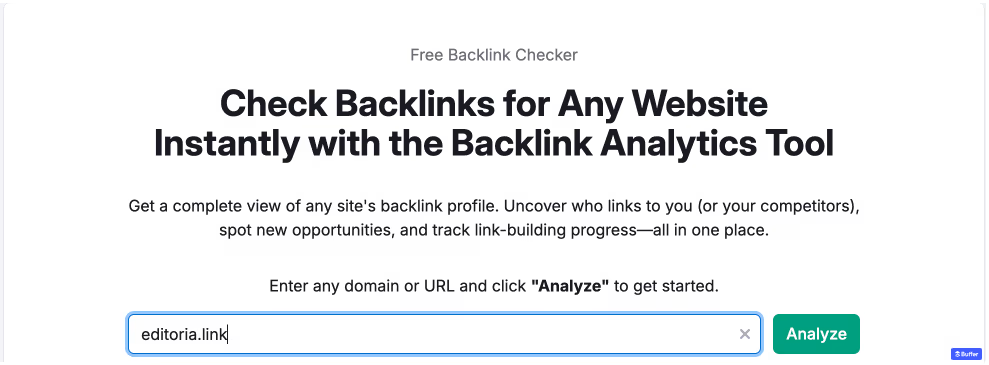
Semrush pricing
Semrush offers a free account, which gives you 10 backlink reports per day.
That’s enough to see what the platform has to offer, but not enough to run link-building campaigns, so you will need one of the higher-paid plans: Guru or Business, starting from $249+ per month.
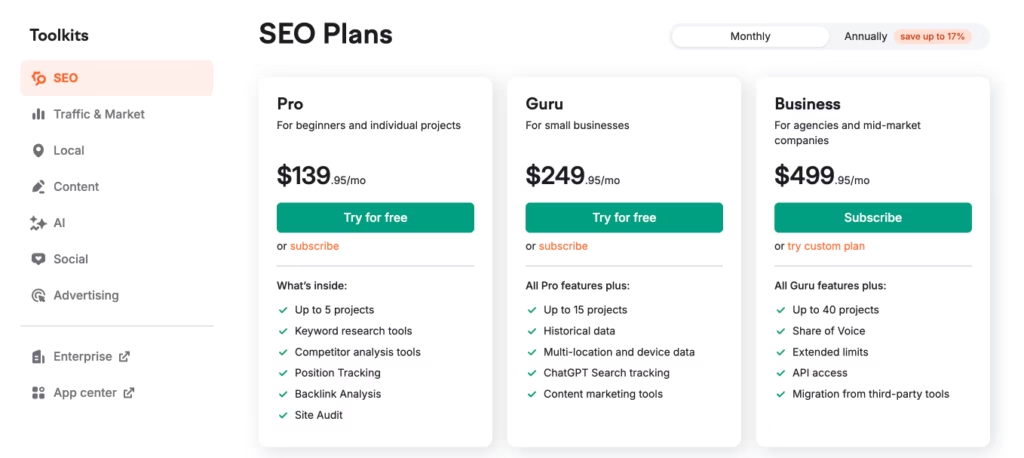
You can also find numerous free tools on the Semrush and Backlink websites.
Semrush Pros
✅ Authority Score & Toxicity Score combo gauges link power and flags risky links.
✅ One-click disavow export simplifies penalty recovery workflows.
✅ New/lost link alerts help keep track of your campaigns.
✅ Network Graph clusters domains by shared IP/C-block, making it easy to detect PBNs.
Semrush Cons
❌ Users have reported inaccurate link reporting and slow new link discovery compared to Google Search Console.
❌ Backlink Gap is limited to five domains at a time, restricting wider competitive analyses.
❌ Batch analysis is limited to 200 URLs.
3. Majestic
Majestic is the longest-running, backlink-only platform, known for its proprietary Trust Flow and Citation Flow metrics.
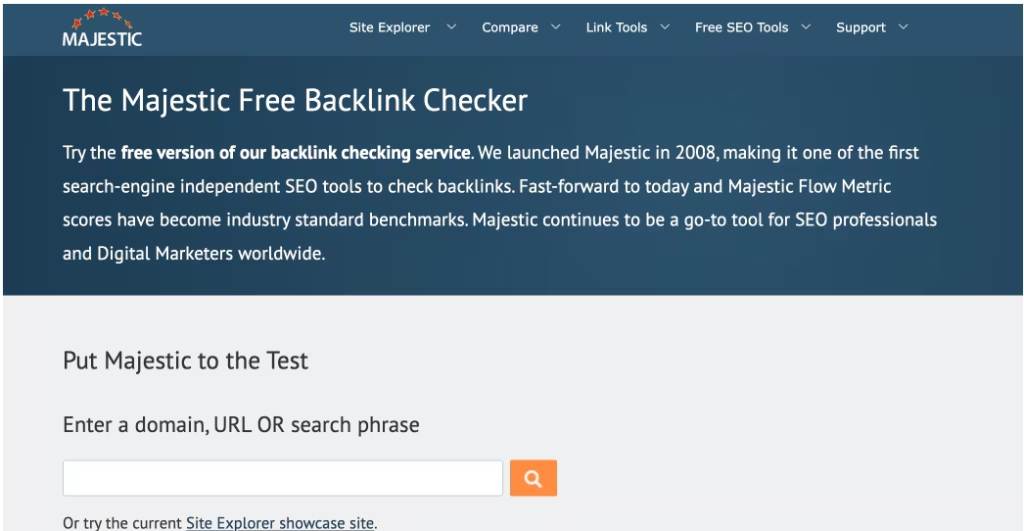
Its dual databases — Fresh (updated daily) and Historic — include roughly 21 trillion backlinks, which gives you both up-to-date and legacy views of any site’s link profile.
Topical Trust Flow enables you to assess the thematic relevance of prospects at a glance, while Link Context displays the exact on-page placement of every backlink for enhanced quality control.
Majestic Pricing
Pricing starts with the Lite plan at $49.99 per month, but to access features like the Historic Index, you will need the Pro tier (starting at $99.99 per month).
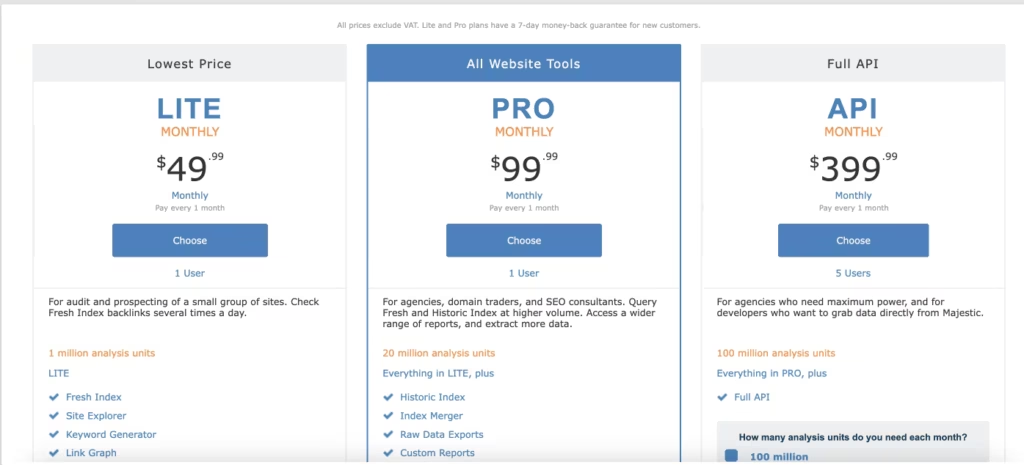
Majestic Pros
✅ Clique Hunter, like Link Intersect, uncovers domains that link to multiple competitors but not to you.
✅ Neighborhood Checker detects shared IP hosting clusters to flag potential PBN risks.
✅ Bulk Backlink Downloader exports complete link lists for offline filtering and custom analysis.
Majestic Cons
❌ Majestic sometimes assigns poor TF/CF scores to reputable websites, so use the metrics with caution.
❌ Lacks real-time new/lost-link alerts
❌ Index refreshes only once a day, and users have reported it may overestimate the number of links.
4. SE Ranking
SE Ranking positions itself as the budget-friendly all-in-one SEO suite.
Its live backlink index covers about 2.9 trillion links across 400 million domains, refreshed several times per day.
This is ample enough for most small- and mid-scale campaigns, but may not satisfy the needs of a large website.

Just like the other tools, SE Ranking features Backlink Gap analysis, broken link analysis, and anchor text analysis.
SE Ranking Pricing
SE Ranking is more affordable than that of larger competitors.
The lowest, Essential, plan is €47.20 per month when billed annually.
However, beware of its limits.
The plan allows you to analyze only 50 domains for backlink analysis a day, which isn’t a lot. For the Pro plan, that’s up to 200, and for Business, up to 500.
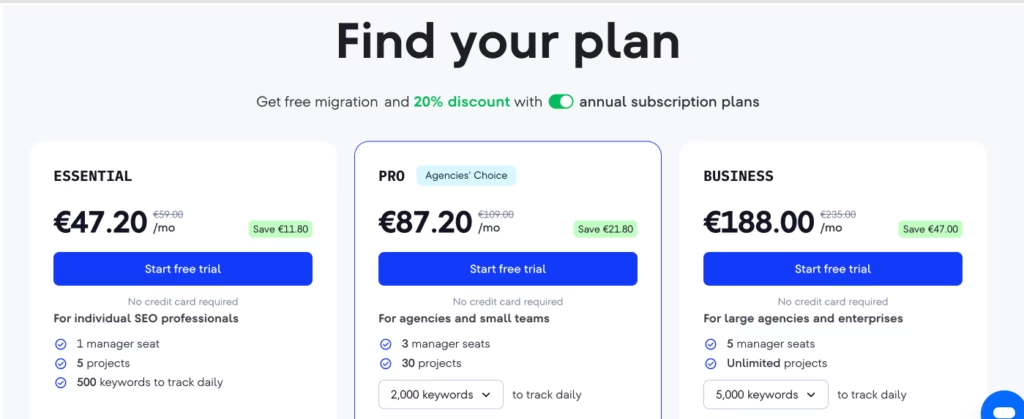
SE Ranking Pros
✅ Proprietary Domain Trust and Page Trust metrics for high-level quality evaluation.
✅ Toxicity Score grades risk on a 4-level scale.
✅ Built-in toxic-link scoring with one-click disavow export streamlines cleanup.
✅ Backlink monitoring with continuous new/lost-link alerts.
SE Ranking Cons
❌ Smaller index than Ahrefs or Semrush.
❌ Fewer advanced filters (e.g., anchor language, traffic ranges) limit deep slicing.
5. Moz Pro
Moz Pro is one of the most established players in the SEO suite space.
Its Domain Authority (DA) and Page Authority (PA) are industry-standard metrics used to assess the value of backlinks.

Moz Pro claims a 45.5 trillion-link index covering 1 billion domains and 8.7 trillion URLs. The index gets updates every 3 days on average.
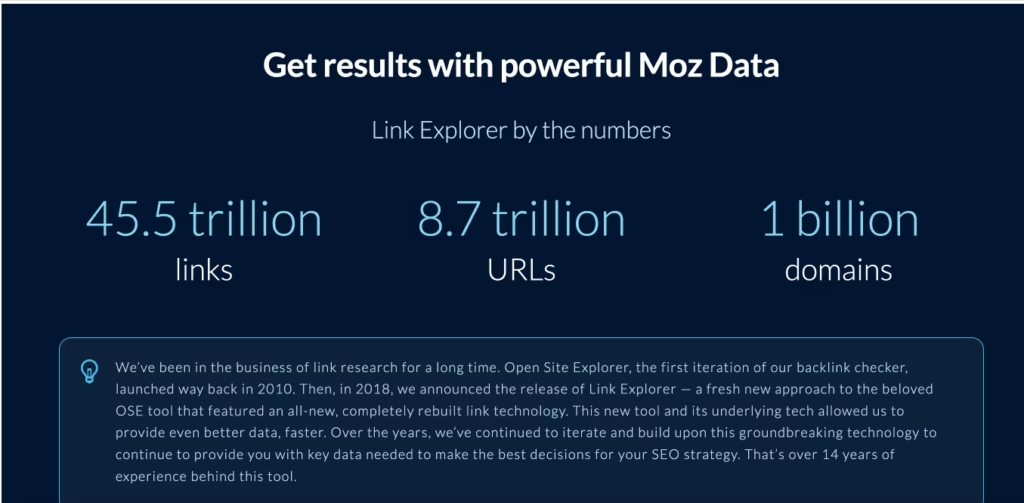
Moz features all the standard features, including Link Intersect, Top Pages, and Anchor Text analysis, which allow you to execute data-driven link-building campaigns.
Moz Pricing
Moz pricing starts at $49 a month, but it only allows 75 backlink queries per month, which isn’t much use for mid-size or large businesses.
The Standard plan, starting from $99 a month, has a much more generous allowance of 5,000 queries.
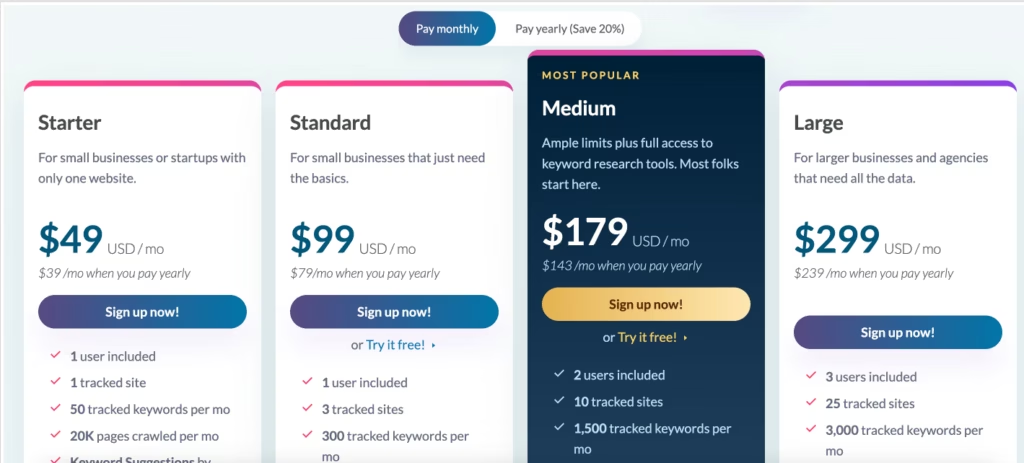
Similar to all the other tools, Moz gives you access to its DA checker and other tools with limited functionality free of charge.
Moz Pros
✅ “Discovered & Lost Links” timeline highlights sudden spikes or drops for fast diagnosis.
✅ Anchor-text distribution chart reveals over-optimised phrases at a glance.
✅ Side-by-side domain comparison (up to four sites) offers quick authority benchmarking.
✅ Spam Score based on shared patterns with penalized websites.
Moz Cons
❌ Slower link discovery — fresh backlinks can take weeks to appear, according to some users.
❌ Historic depth is shallower than Ahrefs or Majestic, which restricts long-term trend analysis options.
❌ Batch analysis restricted to 50 URLs.
6. Seobility
Seobility is the low-cost SEO suite many freelancers reach for when they need quick backlink checks without a steep learning curve.
The platform doesn’t disclose its index size, but based on internal statements, it tracks around 300 million links.
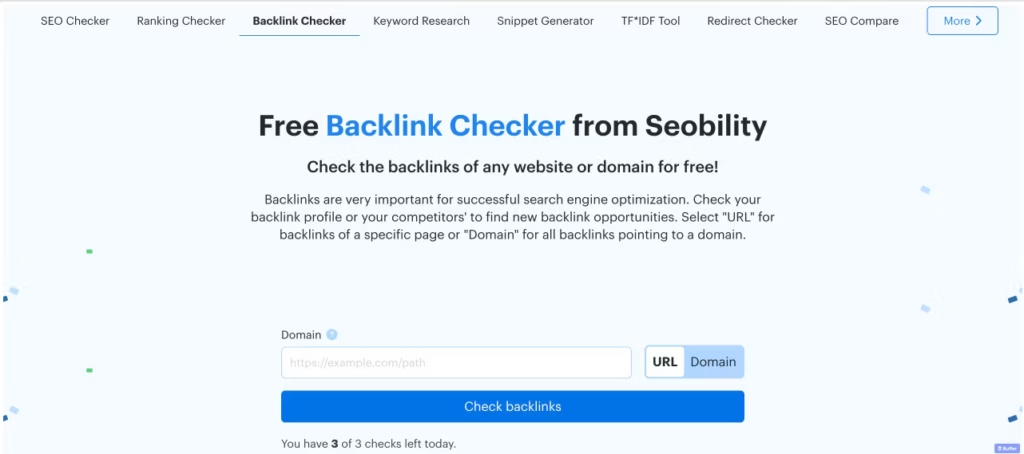
Seobility Pricing
The basic free account doesn’t include any link monitoring or analysis features, so you need to upgrade to Premium or Agency plans, which start from €49.90 and €179.90, respectively.
What features are we talking about?
The usual: Backlink overview, broken backlink audit, anchor text analysis, and personalized prospect recommendations based on competitors and keywords.
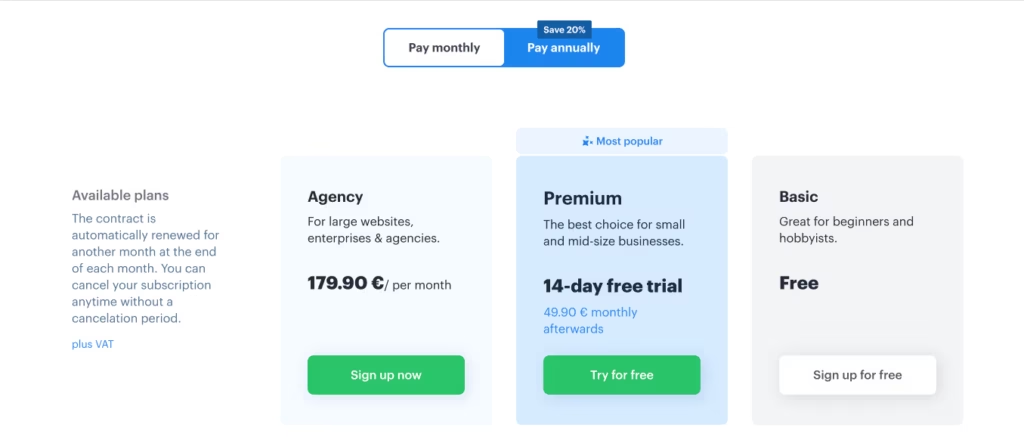
Seobility Pros
✅ Link Rating metric gauges link strength on a 0-100 scale.
✅ Weekly email alerts flag new and lost backlinks automatically.
Seobility Cons
❌ Weekly updates may not be frequent enough for agencies.
❌ No published index size, but it’s smaller than competitors, so it may not be enough for larger organizations looking to exploit every opportunity.
❌ Limited filters — can’t slice by traffic, language, or platform for deeper prospecting.
FAQ: Best Backlinks Checkers
Let me wrap up by answering some of the most frequently asked questions about backlink checker tools.
Who has the largest and most frequently updated backlink database?
This is a tough question because it’s difficult to find reliable, objective data.
When you trust the company's claims, Semrush has the biggest database. I have also noticed that it detects new links more quickly than Ahrefs.
However, most experts in our survey believe Ahrefs has the most comprehensive data.
Anyway, it’s either of the two, Semrush or Ahrefs.
Are free backlink checkers still accurate and useful in 2026?
If you’re not building backlinks for a living, a free backlink checker is more than enough.
However, the tools offer limited data samples, quotas, or filtering options, so you won’t be able to run link-building campaigns using just the free tools.
Which backlink checker works best for large websites or agencies?
There’s no simple answer to this one.
At Editorial.Link, we use Ahrefs because its historic data goes way back to 2013.
No other tools can match it. It’s also the most popular tool, so there’s a bigger chance that new team members will be proficient in using it, and we liked the uncluttered UX.
Having said that, Semrush is a robust alternative that will easily satisfy the needs of all large teams.
So at the end of the day, it all comes down to individual preferences.
Final Words
Ahrefs and Semrush are the primary contenders for the title of best backlinks checker tool. They offer huge, frequently updated databases, multiple ready-to-use reports, and fine-grained filtering features.
For small to medium-sized websites, Majestic, Moz, and SE Ranking are viable alternatives, while Seobility is suitable for freelancers.

